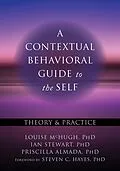The self plays an integral role in human motivation, cognition, and social identity. A must-have addition to any acceptance and commitment therapy (ACT) practitioner's library, A Contextual Behavioral Guide to the Self translates the ACT model's most difficult yet essential process into easy-to-apply steps and user-friendly language.
Every client who partakes in ACT must identify a self as part of their treatment, and clinicians often report that observing the self, or "self as context," is the most difficult of all six core ACT processes. This is because it's so hard for people to shed preconceived notions of "who they really are," and negative perceptions of the self can lead to feelings of low self-worth that stand in the way of treatment.
Problems with the self arise when clients orient themselves in the world and learn to relate to others, but these problems can vary considerably. For example, some clients may have deficits in...
Autorentext
Priscilla Almada, PhD, is a contextual behavioral scientist/practitioner based in Sydney, Australia. She is founder and director of On Becoming Us, an independent, research-based initiative for developing and pursuing prosocial leadership and communities. To further explore or support this work, visit: onbecomingus.com or drpriscillaalmada.com.
